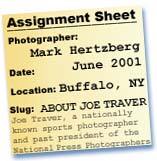

 |
 |
ABOUT JOE TRAVER
by Mark Hertzberg
Director of Photography
Racine (WI) Journal Times
Joe Traver, a nationally known sports photographer and past president of
the National Press Photographers Assocation, was arrested recently on sex charges
involving a teen-age boy. Traver was also well known for his efforts setting
up educational seminars for photojournalists. He was found dead in his hot tub
a week later.
Joe Traver committed suicide two weeks
ago, and the world of photojournalism is abuzz with the news. Photographers
on the Internet are suddenly questioning what they do for a living, since Traver
wrote a long farewell note, saying he "can not endure another walk for the TV
cameras, being photographed by my peers in the media."
I've thought a lot about the discussion about Joe Traver these past weeks. I've
thought of journalists writing about coming to grips with how we treat defendants...but
really only when one of ours raised the issue in his suicide note.
Much of the discussion shows the pain that people go through when a close friend
or acquaintance is accused of something horrific and the presumption of guilt
that comes with the first-day's news coverage; much of it shows the pain people
go through when a close friend or acquaintance commits suicide.
Was Joe innocent? Was he a victim of vengeful cops, as some assert? Or was he, indeed, guilty of the accusations that had been brought and, police said, were yet to be brought?
Some people know for sure, but there will never be a trial for the rest of us to know. There was a thoughtful piece in the Buffalo News which addresses head-on some rumors that have floated around about Joe, and also talks about another group of people who must be thought about in cases like this, as well, the alleged victims of alleged crimes.
http://www.buffalonews.com/editorial/20010622/3010550.asp
There are no clear cut answers, only questions, but we must think of everyone touched by any story like this (and isn't it a statement that as a journalist I instinctively typed the word "story" instead of using another word?). These incidents, whenever they happen in the world, are peoples' lives, not just another story to cover, or another photo to shoot.
One colleague offered this perspective in an e-mail to me:
"Remember Marc Anthony in Shakespeare?
'The evil men do lives after them, the good is oft interred with their bones.'"
I know that Joe did many, many positive things for our profession. I didn't know Joe well enough to join in the flood of e-mails praising his contributions to Photojournalism.
Perhaps it's best that I didn't know him well, as I write these words, because I'm frankly troubled by some of the e-mails from colleagues around the country.
There's a presumption among some that the cops had it in for Joe, and that he was certainly innocent (until proven guilty). But that's not always the way it plays out in real life when we write our stories and shoot our photos.
Joe wrote about the "feeding frenzy" following his case helping drive him to his suicide.
Joe was one of our own, so our own are sitting up, taking notice, and crying foul.
Would the photographers now praising him have reacted differently if it were the same accusations and same set of circumstances involving...a politican? And how. The jokes about a politician in a similar predicament would have continued even past his death.
Journalists usually deal in absolutes; there seem to be few shades of gray in our work. When a story becomes personal, it suddenly turns real gray.
Mark Hertzberg
Director of Photography
Racine (WI) Journal Times
hertz@wi.net